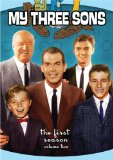| Reviews & Columns |
|
Reviews DVD TV on DVD Blu-ray 4K UHD International DVDs In Theaters Reviews by Studio Video Games Features Collector Series DVDs Easter Egg Database Interviews DVD Talk Radio Feature Articles Columns Anime Talk DVD Savant Horror DVDs The M.O.D. Squad Art House HD Talk Silent DVD
|
DVD Talk Forum |
|
|
| Resources |
|
DVD Price Search Customer Service #'s RCE Info Links |
|
Columns
|
|
|
My Three Sons - The First Season, Volume Two
Author's note: As regular consumers of TV on DVD know, the marketing gimmick of arbitrarily splitting up complete seasons of vintage TV series into two separately released volumes has become, regrettably, an increasingly common practice. Having written an in-depth review of My Three Sons: The First Season, Volume One back in November, and since stylistically and aesthetically, there is no difference between the first and second half of that 1960-1961 season (particularly when you factor in the remarkable contribution of Peter Tewksbury, who directed every episode of this first season), I've rewritten my original review of that season to cover this Volume Two release - with additional commentary added at the end, discussing specific episodes from this volume.
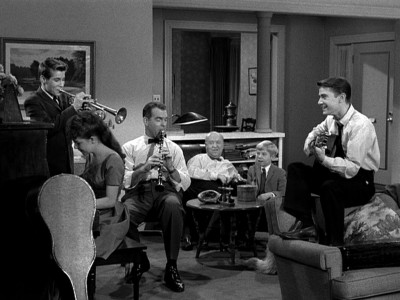
Yes. I know they changed the music. I don't know if My Three Sons carries a whole lot of weight in the pop culture conscience of an average TV viewer today, but I can say, after watching these last 18 black and white episodes from the premiere 1960-1961 season, that these early shows are something quite rare and special indeed - which makes it all the more hard to recommend buying this particular DVD version when almost all of the music has been re-composed for the episodes (except, of course, for the iconic opening sax theme by Frank DeVol). Do we throw the baby out with the bath water, and say, "If a single frame or music cue is altered, we will not watch and we will not buy," or do we compromise, and try and enjoy what is there? It's an impossible argument either way, and one that vintage TV lovers wrestle with every time a release like My Three Sons - The First Season, Volume Two comes down the pike.
My Three Sons was created by Leave it To Beaver writer George Tibbles and producer Don Fedderson (who would go on to create the equally brilliant and unfairly maligned Family Affair), in partnership with Hollywood leading man Fred MacMurray (who owned half of the series) and Chevrolet, the show's sponsor (the end credits of the episodes on this disc carry "commercials" for 1960 Chevys). MacMurray, who at one point during the early forties was the highest paid actor in Hollywood (a fact that many fans don't know who only concentrate on his later TV and Disney resumes), had by 1959 settled into a solid if unremarkable leading actor career in lesser-tier westerns and adventure films, while doing stellar, Oscar-worthy work as a supporting actor in films like The Caine Mutiny and the soon-to-be-released The Apartment (interestingly, both of which show MacMurray as a cowardly, vile rat). But in 1959, out of the four films that MacMurray had in release, a low-budget, silly Disney live-action comedy, The Shaggy Dog, became one of the highest grossers of the year-end box office, and certainly one of the biggest hits of MacMurray's entire career. The lesson of the success of that little Disney comedy, which was shot and which looked liked so many of the sitcoms on TV at the time, couldn't have been lost on MacMurray when the opportunity to star in My Three Sons came along that same year. The economic rewards for a successful TV series at that time (particularly when you owned half the series) were potentially enormous (Lucy and Desi had bought RKO with the spare cash they had lying around), but the demands on the star's time were equally impressive, particularly when you factor in that this first season consisted of 36 episodes!
Faced with the prospect of shooting a full season of episodes, MacMurray, according to some reports, sought out the advice of TV's most successful sitcom dad at the time, Robert Young, from CBS' Father Knows Best, who clued MacMurray in on the realities of a grueling, seemingly non-stop, year-long TV shooting schedule (which must have been an eye-opener to MacMurray, a film actor, who was used to coming on a set, shooting for a few weeks or months, and scooting off to a new location or back to his Hollywood home). In what now has famously become known as "the MacMurray Method," MacMurray, a really sharp businessman as well as a terrific actor (MacMurray died one of the richest actors in Hollywood) stipulated in his contract that he would only work 65 non-consecutive days out of the year on My Three Sons. MacMurray would make himself available in the spring for a month to shoot whatever material the writers and producers had for him, and then take off on vacation for the summer. He would return in the fall, and finish any remaining scripts, as well as necessary pick-up shots (for continuity), ending his commitment to the show before Thanksgiving. This rather remarkable production schedule certainly minimized the time notoriously cost-conscious MacMurray had to spend on his series, but evidently, it caused a nightmare for the writers and producers who only had MacMurray for those 65 days: if they couldn't fashion the episodes out of the footage they had, they were out of luck.
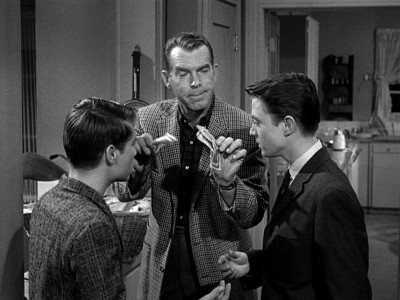
Not only did this kind of shooting eliminate "shooting in sequence" (for TV, shooting one full, complete episode per week), it created enormous logistical problems for the producers who had to shuffle actors back and forth over intervening months to pick up the simplest shots to complete an episode. As well, the writers were often-times faced with incomplete scripts. MacMurray would be shot doing a little bit of non-specific "business" or delivering a generic monologue on a generalized subject, which the writers would then fashion into a complete script, months later. As for the other actors, concerning MacMurray's "Method," well...tough. Often-times, MacMurray might spend days alone on the set, performing countless reaction shots (entirely out of context and sequence) or delivering endless lines that were to be inserted later into episodes, all of which would then be reconfigured into footage shot months later (or before) with actors reacting to a non-existent MacMurray, who might have been golfing at that moment, or shooting one of his many subsequent Disney films during his vacation and hiatus from the show. Of course, the "MacMurray Method" isn't particularly novel in its creation (it is, after all, how most feature films were and are shot, and a method probably most comfortable and familiar to the film actor MacMurray), but its introduction to TV production methods was certainly innovative.
All of which makes the artistic accomplishments of these last 18 episodes in the My Three Sons - The First Season, Volume Two all the more remarkable. I would imagine that most TV fans are more familiar with the later color episodes of My Three Sons, when the show moved to CBS (ABC refused/was unable to foot the bill for the series' move to color), and co-star William Demarest joined the cast as Uncle Charley O'Casey, the brother of Michael Francis "Bub" O'Casey (William Frawley), who left/was fired from the show in 1965. My Three Sons was finally winding up its long run in the early 70s when I was little, and I remember watching the show and feeling, even then, that there was something "off," something "empty" about the entire feel of the series, which seemed hermetically sealed off from scene-to-scene (perhaps the "MacMurray Method" effect), a feeling reinforced when I catch an occasional color episode today. Despite the ever-growing cast of the later seasons, when wives and girlfriends and new little kids were introduced with abandon, the later seasons always have a kind of lonely, still, airless feel to them.
Not so for these remarkable episodes, though, in this last half of the first season. My Three Sons basic premise follows the suburban adventures of the Douglas family, minus one very important part of the traditional American sitcom nuclear family: the mother. Steve Douglas (Fred MacMurray), a former pilot and now aviation and missile engineer for the Universal Research and Development Company, has been a widower for six years. Living in a comfortable but not ostentatious middle-class neighborhood in a comfortable, not ostentatious Midwestern suburb, Steve's life revolves around either working long, hard hours not only at his office but often times late into the night at his bedroom drafting table, or trying to solve the problems a busy father might have raising three rambunctious, healthy American boys. Mike (Tim Considine, a Disney veteran who co-starred with MacMurray in the smash hit, The Shaggy Dog), the eldest son at 18, is facing the rather frightening prospect of leaving behind his comfortable high school days, where he's a handsome and popular student, for the prospect of college, while negotiating his way through his relationship with steady girlfriend (who lives right next door, of course), Jean Pearson (Cynthia Pepper). Robbie Douglas (Don Grady), at the awkward age of 14, is trying to find his place as the middle child in this noisy group, often times competing with Mike for Steve's approval, while still reconciling himself to the fact that he's not a boy anymore, but not yet a man, either. And finally, little Chip Douglas (Stanley Livingston), seven years old and full of energy, is just trying to negotiate his way around this relatively new world in general. Not at all a traditional (and clichéd) sitcom "smartass," Chip is a genuinely funny little boy with a quirky outlook on the events that unfold in the Douglas house - a viewpoint that exasperates his older brothers at times. Helping Steve watch over the boys is Michael Francis "Bub" O'Casey (William Frawley), Steve's father-in-law, who gave up his life running a movie theatre to come live with Steve and the boys, acting as a surrogate "mother" who cooks, cleans, attends PTA meetings and tea socials, and who provides gruff, no-nonsense (but loving) "front-line sergeant" discipline for the boys when calm, cool, collected "general" Steve is busy at work.
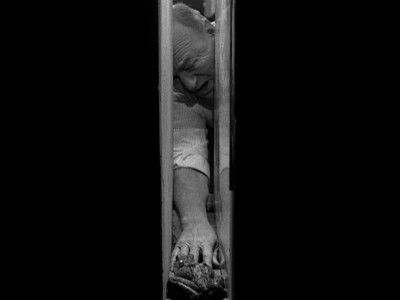
Increasingly, as I watch first-hand more and more episodes of classic TV, I'm convinced there is a treasure trove of brilliance in hundreds of hours of early network TV that has been unfairly dismissed as "junk" by critics who are either deliberating misreading these shows (usually for political reasons) or who literally haven't seen them (and who just regurgitate the same clichés they've read in other writings without going to the original sources). And My Three Sons fits comfortably within that trove. Having only seen the later color episodes, I never thought of My Three Sons as anything more than a pleasant, if unremarkable, suburban sitcom starring a heavy-hitting Hollywood star. But after watching these last outings (with the memories of the first season's first volume of episodes still firm), I was suitably impressed with these rather remarkable episodes. Network TV series, just like films, are a collaborative effort, but it must be noted that producer and director Peter Tewksbury deserves the lion's share of the credit for these beautifully crafted episodes. Directing every single episode of this first season (a sizeable logistical feat, even had the episodes turned out to be mediocre - which they most certainly are not), Tewksbury displays a fluid camera style (and, by design I would imagine, the footage for seamless editing) that resembles a particularly accomplished feature film, not a rushed, weekly TV series.
Tewksbury's style (with the aid, of course, of excellent screenplays by a roster of fine scribes) here encompasses both surprisingly straight drama, as well as a predilection for comedic set-pieces that are as beautifully crafted as his drama scenes are emotionally resonant. Watching these last 18 episodes of the season, I was again struck, episode after episode, with Tewksbury's felicity with blocking his actors in a dreamy, fluid style that would do justice to a big-screen effort. These episodes of My Three Sons just don't look like any other sitcoms that's I've seen from this period (in the beautifully sweet, The Croaker, where Bub revisits his childhood when he becomes attached to Chip's frog, Tewksbury gives us an amazing shot of Bub trying to free the frog from behind the stove, filling the screen almost entirely in black - a big no-no for networks back then, who frowned on experimentation with their usually bland visual design). There's an elevated level of technique, in camera movement, in editing, in scripting, as well as in the performances, that's flat-out remarkable. The comedy of misdirection is often utilized in these later episodes, with typically fine results. In The Delinquent, not only is Jean mixed up about what Mike is doing with his nights (he's building her a hi-fi set), Bub adds a layer of confusion to the mix when he assumes Robbie and Chip's discussion of that hound Tramp's nocturnal adventures pertain to Mike. Man in a Trenchcoat travels the same ground, while The Lostling achieves genuinely sick suspense when a mother purposefully leaves her baby in the Douglases' car (thinking it's hers), while the bachelors cope not only with caring for the "lost" child, but also with trying to understand why a mother would abandon a child (of course, the mother didn't abandon the baby; but let it rest in the car - yikes! The 50s! - with the father checking in on it all the time...only he was mistakenly checking in on a wrapped up baby doll!).
Tewksbury's visual schematic is invariably scrupulously funny and precise, as well, building up scenes that could have come over as flat or uninspired, into minor comedic gems. The Horseless Saddle is a good example, where an errant saddle travels around town in search of a horse, with Steve seeing it mysteriously "float" by his office window (after which he hears a horse neigh), the mystery of which increasingly occupies his and his partner's thoughts as to exactly how that happened (Tewksbury organizes a funny chase pile-up, as well, complete with sped-up chipmunk voices on the soundtrack). Unite or Sink, where Robbie and Mike try to paint a neighbor's fence with the whole neighborhood eventually butting in, reaches Seinfeld absurdist levels (in other words, it reaches the level of absurdity of many older sitcoms series, particularly The Abbott & Costello Show and The Adventures of Ozzie and Harriett, shows which Seinfeld discreetly "recycled"). An even better example of this absurdist comedy - and one of the best episodes out of the entire season - is The Sunday Drive, which focuses not on Steve but his next door neighbor, Henry Pearson (played to utter perfection by the brilliant Robert P. Lieb). Henry, overcome with an irresistible, almost mystic case of "Spring fever," begins to recite poetry, and designs to take his wife on a romantic Sunday drive. He even goes as far as to size up her enviable rear-end for a playful swat (stopped in time by shocked daughter, Jean). Slowly, however, almost inevitably, his plan is thwarted by more and more kids piling into his station wagon, until he finally, gently, blows his stack. AJ Carothers wrote the script, and Tewksbury, with the aid of Lieb's almost preternaturally focused slow-burn, builds this episode to memorable heights of barely-suppressed hysteria.
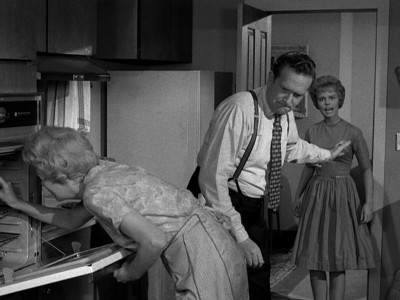
And while Tewksbury can deliver an expertly crafted comedic scene, he's equally adept at more innovative moments in this first season. Certainly his masterpiece this season is Small Adventure, a beautifully bizarre episode, split into two distinct parts. Steve, staying in a hotel room in another city, awakes to a coming storm. Feeling a bit lost and lonely, Steve talks himself into phoning home (for no reason than to hear his family's voices) after he discovers, in a rather bizarre Kafkaesque moment of suspended personal reality, that he doesn't "exist" with the hotel; he's been mistaken with another guest. Worried that something may have happened at home over the past few days - with no way for the family to leave a message for "Steve Douglas" when he doesn't exist with the hotel - Steve calls home. And it's a good thing that he does, because his vague premonition that something could be wrong at home is spectacularly close to the truth: Tramp, digging at a local quarry pit, has brought home an old, unstable stick of dynamite. The dynamite quickly becomes enmeshed into the fabric of the busy Douglas home's chores, where it narrowly escapes being trod-on, smashed, and various other calamities that would surely blow the entire neighborhood block to kingdom come. In a moment of sheer poetry unlike anything I've seen from this time period on TV, as the storm passes from Steve's location (and we realize that the boom we heard on the soundtrack was not the dynamite blowing up his house), the thunder reaches the Douglas house, with Steve finally able to get some sleep, secure in the knowledge that his family is safe...and totally unaware of how close they came to getting blown sky high. When Tewksbury allows Tramp the dog, dynamite stick firmly in his jaws, to come into extreme close-up frame, and look directly at the camera, and us, as if to say, "See what's going to happen, TV viewers? Get ready...," that's a moment of startling, lucid genius.
Outside of the cinematic innovations he brings to these 18 episodes, as well as his extended, exquisite comedy scenes, Tewksbury shows an assured hand on the straightforward drama that routinely pops up in these episodes, too. Soap-Box Derby, written by John McGreevey, cleverly cross-cuts between Steve's and Robbie's efforts at their "jobs" (Steve is brought in at the last minute to salvage a failing missile assignment, while Robbie, on the spur of the moment, decides to design his own derby racer to get the attention of a girl), with Steve, believably, messing up at work. So much for all the social critics and "TV historians" that keep insisting that 50s and 60s television was a desert of unrealistic, fantasy suburbs filled with perfect little families, headed up by never-fail dads. Expanding on that theme, Other People's Houses, again written by McGreevey, shows a chillingly sterile view of suburban loneliness when the Douglas house - full of rambunctious, battling, arguing boys messing up the premises - is contrasted with a friend's perfectly appointed, ruthlessly organized, spic-and-span clean house, complete with a mother/housewife who restlessly roams from room to room, straightening and cleaning objects that don't need straightening and cleaning, and an absent, overachieving salesman father who simply can not communicate with his son or wife. It's a bleak, dark view of suburban 1960s life - one that no doubt would please critics who love to find examples of America pop culture disparaging itself - but it's only the flipside of the bright, warm, loving, chaotic, messy Douglas household...and those existed back then, too. For a sitcom that's often referred to disparagingly as "Disneyesque" (a vague, facile pejorative, at best), My Three Sons is a most remarkably complex American sitcom.
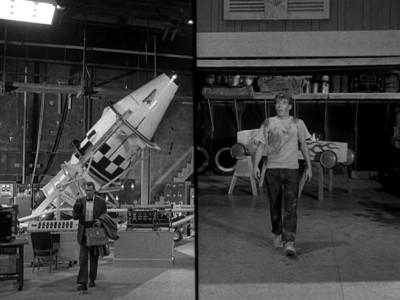
Which brings us to this release of Paramount's My Three Sons discs. There has been a bit of small firestorm on quite a few DVD websites concerning My Three Sons, yet another CBS/Paramount DVD release of a vintage TV show that features a newly-composed score, due to prohibitive music release fees (or possibly the threat of copyright infringement for the studio who may not own the exclusive rights to the music, and thus may face exorbitant legal penalties if the product was released). I've been on both sides of this argument concerning edited or altered DVD releases of TV shows, depending on the product (and on my own evolving view on this matter). For a small group of vintage TV fans, there can be no small allowances made for such egregious editing/alterations; the studios are artistic philistines who savage the art which is in their care, and all for a measly buck. I can understand their anger, and I sympathize. I feel the same way about the product itself; I hate the fact that music for most of the My Three Sons episodes have been re-scored. I don't find the new music particularly well-composed (but I also don't find it exceedingly bad and intrusive). It simply "alters" the product for the worse. And I wish that wasn't the case. In a perfect world, this wouldn't happen (and importantly, other studios seem to be able to release product with music largely intact, while Paramount has deservedly gotten a pretty piss-poor reputation now, unfortunately -- because the video element of their releases are usually top-shelf - for their repeated altered releases).
That being said, I'm not going to throw the baby out with the bath water for My Three Sons, simply because too much of what is here is valuable and entertaining - despite the alterations. Those ready at this point to cry, "Foul," don't bother. I wrestle with these kinds of critical decisions all the time with these releases, and I agonize over them. But ultimately, I have to go back to my own TV-watching past for the answer to these kinds of questions, and the answer that always comes back is, "Life is too short to obsess over what isn't perfect." I grew up watching TV on a crappy little black and white portable, seeing films as diverse as Lawrence of Arabia, Casablanca, The Great Escape, and all the Godzilla films in formats that utterly negated the original intentions of their creators. Films that were shot in color, I saw in black and white. Films that were shot in ultra widescreen, I saw severely cropped on a 19-inch screen. Films that were meant to be seen on a silver screen forty feet high, I saw on a snowy, rabbit-eared cathoray tube TV that only looked good on a rainy day, for some reason. Films that were meant to be seen with full stereophonic sound, I heard through a tinny little 2-inch speaker. And films that were meant to be seen in one uninterrupted sitting, I watched cut up into little 12-minute pieces, interrupted constantly by commercials for dog food and feminine deodorant spray (along with older TV shows, like My Three Sons, that were edited from the start, by being chopped up for syndication running times). None of that stopped me from enjoying these films and TV shows, nor from me seeing the importance of them, nor from experiencing them as "art," if you will. None of that did. So you'll excuse me if, even though I don't like it, I don't think the excising of the interior music for the last 18 episodes of My Three Sons, is the end of the world. It's not right. It's not the way the show should be seen (ironically, those that refuse to watch these altered episodes would gladly do so if they were intact -- but watching them on DVD on a huge monitor, with no commercial interruptions, is also aesthetically "incorrect" in relation to the original experience of show). But there it is. That's how it's presented to us today. I have no idea if it will ever be "reconstructed" the right way - or if indeed, it can ever be reconstructed. What I do know is that there are so many wonderful, deeply funny and emotional, truly innovative moments in this first season of My Three Sons, that they survive the new music. Not to experience them just because we're not getting the episodes in pristine, unaltered condition, is spiting ourselves needlessly. Of course, free will still rules America (hopefully), and the decision to watch these altered My Three Sons episodes resided totally within your own conscience. If you choose not to, I understand. But you'll be missing something wonderful.
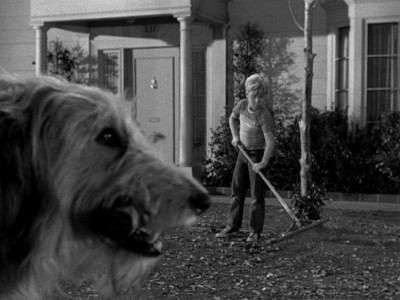
Here are the last 18, one-half hour episodes of the three-disc set, My Three Sons - The First Season, Volume Two, as described on the DVD insert:
DISC ONE
Organization Women (February 2, 1961)
Problems arise when Steve's overly efficient sister attempts to reorganize the Douglas family's chaotic household.
Other People's Houses (February 9, 1961)
Robbie and his new friend have one thing in common: they're both envious of each other's home life.
The Delinquent (February 16, 1961)
Suspicious about his nightly disappearances, Mike's girlfriend never suspects he's spending his evenings building her a surprise birthday present.
Man in a Trench Coat (February 23, 1961)
While Steve is away for the evening, Robbie and his date discover a trench-coated man is spying on them.
Deadline (March 2, 1961)
After criticizing his school paper's sports page, Mike is given a shot at revamping it himself.
The Lostling (March 9, 1961)
Confused with a leg of lamb, a baby winds up in the back of Steve's station wagon.
DISC TWO
Off-Key (March 16, 1961)
When Chip brags that his big brother can fix anything, Robbie is asked to repair a neighbor's broken piano.
Small Adventure (March 23, 1961)
While Steve is off on a business trip, Tramp the dog brings home his latest toy: a large stick of dynamite.
Soap-Box Derby (March 30, 1961)
While Steve races to help a missile manufacturer beat out a rival firm, Robbie has a rush job of his own: the construction of a soapbox racer.
Unite or Sink (April 6, 1961)
To earn some extra pocket money, Mike and Robbie agree to paint a neighbor's fence.
The Wiley Method (April 20, 1961)
Impressed by his teacher's theatrical approach to history, Robbie borrows the technique to win the heart of a fellow student.
The National Pastime (April 27, 1961)
When Steve is asked to umpire their next baseball game, Chip decides it will be the perfect way for him to become team hero.
DISC THREE
The Croaker (May 4, 1961)
The Douglas' household is thrown into a frenzy when Chip's science project - a frog named Malcolm - makes his escape.
The Musician (May 11, 1961 )
To impress a pretty pianist, Robbie declares his love of classical music - a subject he knows absolutely nothing about.
The Horseless Saddle (May 18, 1961)
Bub sets out to find the mysterious person who sent him an old saddle...C.O.D..
Trial by Separation (May 25, 1961)
To test the strength of their affection, Mike and his girlfriend decide not to see each other for an entire week.
The Sunday Drive (June 1, 1961)
A station wagon full of Douglases accompanies Mike's girlfriend and her family for a "quiet" ride in the country.
Fire Watch (June 8, 1961)
Mike's summer job at the forestry service goes from fun to serious when his boss is stranded and a wild storm is about to strike.
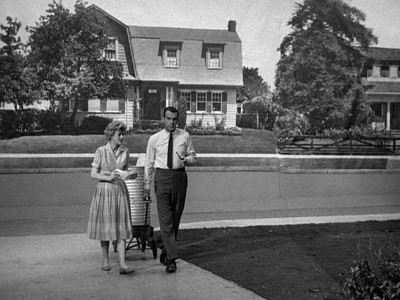
The DVD:
The Video:
Except for one or two instances where I actually saw some fuzz in the gate (it looks like it's on the original transfer material), the full-screen, 1.33:1 black and white transfers for My Three Sons - The First Season, Volume Two are up to the usual CBS/Paramount standards - meaning they look quite good, with a sharp image, a balanced gray scale, and a minimum of compression issues (there was one point, in The Sunday Drive, where a noticeable black-out occurred, which didn't look organic to the original print).
The Audio:
See above for the music substitutions. As for the audio tracks themselves, the Dolby Digital English mono track is clearly rendered, with all dialogue crisply and cleanly heard. Close-captions are available.
The Extras:
There are no extras for My Three Sons - The First Season, Volume Two.
Final Thoughts:
I couldn't see how this second volume of episodes could have improved on the first, but it did. My Three Sons - The First Season, Volume Two is a revelation to those of us who only grew up on the color reruns. Quite simply: the first season of My Three Sons is one of the most unusual and innovative comedies in sitcom history. Period. Producer and director Peter Tewksbury deserves much of the credit for consistently introducing a highly-polished, silky, fluid camera style for the comedy and dramatics here (which are feature-film worthy in their honesty and clarity). How the series will fare in Season Two, without Tewksbury's talents, I can only guess. But I would suspect it won't reach these heights. As for the music substitutions, I refuse to reject this compromised release of My Three Sons - The First Season, Volume Two, because too much of what is here, is truly remarkable. On content alone, this masterpiece of a season should get our highest rating here at DVDTalk: the DVD Talk Collector Series. Unfortunately, the music substitutions do affect the show's impact, so I highly recommend (for those who can stomach the music alterations) My Three Sons - The First Season, Volume Two.
Paul Mavis is an internationally published film and television historian, a member of the Online Film Critics Society, and the author of The Espionage Filmography.


|
| Popular Reviews |
| Sponsored Links |
|
|
| Sponsored Links |
|
|
| Release List | Reviews | Shop | Newsletter | Forum | DVD Giveaways | Blu-Ray | Advertise |
|
Copyright 2024 DVDTalk.com All Rights Reserved. Legal Info, Privacy Policy, Terms of Use,
Manage Preferences,
Your Privacy Choices | |||||||









